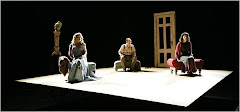The poets then climbed the natural stair and passed on and Dante notices the many little flames reminding him of fireflies upon a hill. Dante almost falling into the chasm from the ledge, acknowledges Virgil who tells him, "There are souls within those flames; each sinner swathes himself in his own torment" (Canto XXVI 46-47). Dante replies to Virgil that he wants to speak with a great flame that splits away into two great horns of fire. We find that this two-pronged flame conceals Ulysses and Diomede whom are contained in Hell because of the three sins they committed. The ambush of the Trojan Horse; the crying of Dieidamia who Achilles abandoned; and the theft of Pallas Athena's statue at the Palladium.

Virgil then speaks to Ulysses and Diomede because he is worried since they are Greek they may scorn Dante's language. Ulysses then tells the story of his death and the perilous journey and travesties he had to face. He spoke of how he encountered the Hercules' Pillars and aroused his men to sail to a giant mountain in which they then encountered a storm and their ship sunk. In this passage the author again uses an allegory and compares and contrasts the use of light and dark. Ulysses states to Virgil during the story of his death, "the light beneath the moon had waxed and waned, 'when death upon our course we sighted, dark in space, a peak so tall...'" (Canto XXVI 122-124). The juxtaposition of light and dark is used throughout the Inferno and in Ulysses' story depicts the development of accomplishment to disaster, similar to the transition of light to dark.
I remember reading the epic journey of Ulysses in middle school and admiring his courage and perseverance. Reading this Canto now I was confused to find that he reserved a place in Hell. Because Ulysses served for the greater good of his crew and portrayed the role as a protagonist and a hero. However, I found that because he was born before Christ that befalls him to become a victim to original sin, therefore he is sent straight to Hell. I also found the fact that Dante could not speak to Ulysses but only Virgil was interesting because of fear of Ulysses scorning Dante's language. I perceive this may be because Dante is Italian which would refer back to his descending from Aeneas and associate him with the Troys that Ulysses despises.


4 comments:
I like that you focused more on Ulysses than Cassius, Brutus, and Judas.
I never thought about Florence and the role it plays in the story before.
But I think if we all journeyed into hell - if anyone did for that matter- they would think hell would descend upon their town or city.
I think this just comments on the fact that the world is a hellish place and that a lot of people would end up there
I did not find your reaction insightful, sorry.
We're all gonna end up in hell, that's optimistic:\
By the way, wasn't Virgil also born before Christianity? If so, then why is he free to journey where he wants to after death, while Ulysses is sent straight to hell for living before Christ?
Ulysses is not in hell because of his "sub Julio" birth. In fact, many readers are confused to see the "hero" in the 8th circle. Unlike Heather who may have read pieces of the Odyssey or Iliad, Dante had no knowledge of the epics. His view of Ulysses was informed by Latin texts and Virgil's Aeneid. Ulysses's ( and Diomedes) role in the Trojan War along with other acts of war and deception is the reason for this placement in hell. Here's a link that may provide a bit more info on the topic: http://danteworlds.laits.utexas.edu/utopia/circle8b.html
Post a Comment